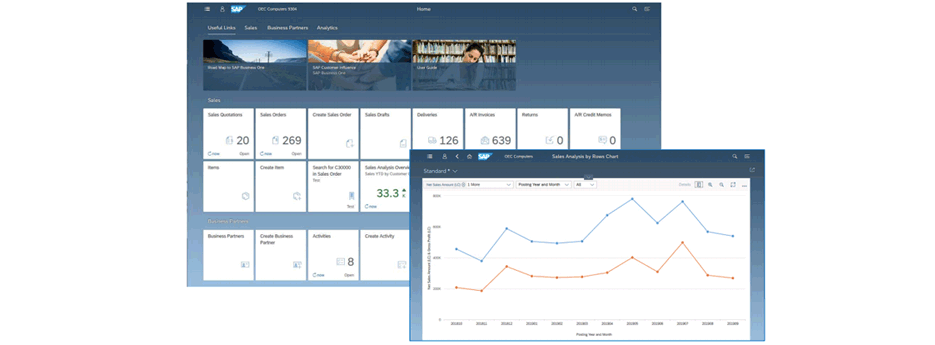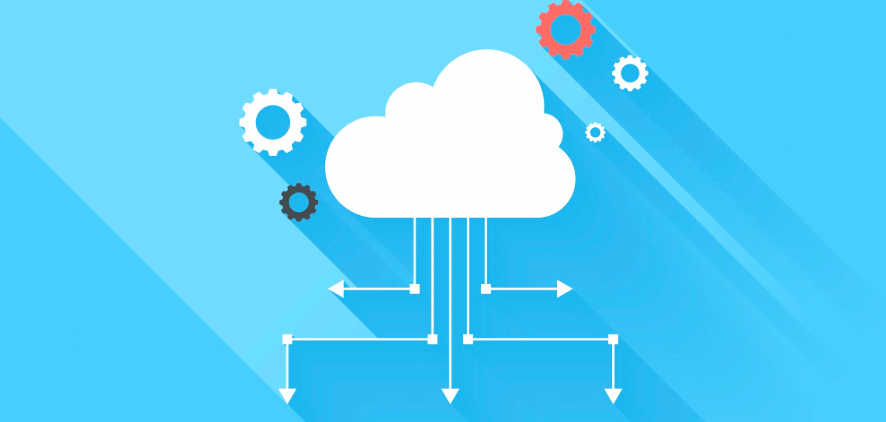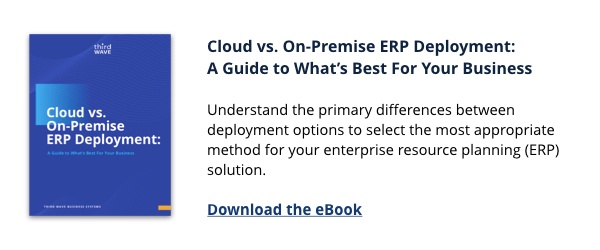Web Client for SAP Business One
SAP Business One 10.0 (MS SQL)
SAP Business One 10.0, version for SAP HANA
- The Web Client is based on SAP Fiori design principles encapsulating SAP Business One core processes and business logic alongside an advanced user experience
- Focused on creation, processing, and updating of Sales Quotes, Sales Orders, A/R Deliveries, and A/R Invoices
- List views for purchasing documents
- Supports creation and update of Items, Business Partners, and Activities
- The Web Client provides some sophisticated analytic charting capabilities
- For optimized user experience launch the Web Client in either a desktop computer or tablet, using the Google Chrome or Firefox web browser. The Web Client can also be launched directly from the regular SAP Business One desktop application
SAP Business One 10.0 Usability
New Skin Style – Belize Deep – SAP HANA
New modern and fresh look and feel. Plus harmonized user-experience for those who work with both SAP Business One and the Web Client.
Features:
- New skin style “Belize Deep” is added to SAP Business One 10.0, version for SAP HANA
- Inspired by the SAP Fiori design and following the Web Client look & feel
- Currently available when using the Fiori-Style Cockpit
- 4K monitors supported when using the Belize Deep skin style
Enhanced User Interface
The information about the current company and logged-in user is displayed clearly. Plus, switching between company databases and users is one-click away.
Features:
- New Show/ Hide Toolbar icon and menu option under View Menu
- Users can enlarge working area by hiding the toolbar
- The company name and user name are clearly displayed at the top center of SAP Business One window; Click it to open the “Choose Company” window directly
Alignment of Form Behavior
Increased usability by avoiding scrolling, especially in busy forms. Alignment with standard system form behavior.
Features:
- Ability to resize and maximize form size is supported in:
Company Details, General Settings, Posting Periods, Print Preferences, Checks for Payment, Document Generation Wizard, Update Special Prices Globally, Trial Balance Revaluation, General Ledger, Layout and Sequence, Request for Generation Approval, Approval Stages, Export Transactions to SAP Business One, Payment Methods, Payment Terms, Query Authorization Groups, Report and Layout Manager, UDF – Field Data, Configuration Management, Cash Flow, Addon Manager
User Name in License & Add-On Administration
Enhanced clarity and transparency of the user’s identity by displaying the user name supports accurate license allocation and add-on administration
Features:
- A new column for displaying the User Name is added to the Allocation and Assignment tabs in License Administration window and to the User Preferences tab in Add-on Administration window
- Filtering according to User Name field is now possible within both forms
- Sorting by User Name is supported in the License Administration window

SAP Business One 10.0: Highlights of the Latest Version
Learn More
We’ve explored how to running SAP Business One in the Cloud, the difference between Private vs Public Cloud solutions, and how to improve business agility with the cloud. Let’s now discuss the benefits of running SAP Business One Cloud.
Key Benefits of SAP Business One Cloud
- Increased Usability: You have the ability to store your data over a network and then access it through a web-based browser or mobile app, so you can access your ERP system from anywhere in the world at any time you choosing.
- Manageability: Since your systems are stored on servers at a remote location, your systems are managed by a Cloud provider.
- Cost: Besides drastically reducing the operations and maintenance costs of infrastructure, the costs are also predictable for your organization in terms of monthly fees.
- Security: Being hosted at a hardened facility, your corporate data is safe at the Cloud hosting center being handled by security experts.
- Scalability/Elasticity: Easily scale up or down depending on your current usage requirements. Accommodate your organizational needs and changing market conditions with the Cloud ERP.
- Automation: Your Cloud providers are responsible for server maintenance and take care of any system updates so the process is transparent for you.
- Environmentally Friendly: By reducing your energy consumption, the Cloud offers a more environmentally friendly method of meeting your business requirements.
There’s no doubt that the benefits of the Cloud improve your business’ productivity, but with all of the pros, there are some cons to consider. How will these potential negatives impact your business? Keep in mind that Cloud is relatively new and there are always associated kinks to work out as the technology improves.
Learn more: Cloud ERP Deployment vs. On-Premise Deployment Options: Pros and Cons
The Cloud can give your company an excellent opportunity to take your business to the next level and reinvent yourself. Embrace the change. You have the option to add value to your business, so why not take it? If you were to take the benefits of your traditional solution vs. the Cloud, you would most likely see that the benefits of the Cloud can outweigh those of the traditional methods.
Third Wave Business Systems uses a cloud deployment methodology that allows you to maximize the advantages and minimize the disadvantages of cloud computing.
Contact Third Wave to get more educated on the benefits of SAP Business Once Cloud and start making smarter business decisions today!

Benefits of Running SAP Business One Cloud
Learn More
An enterprise resource planning (ERP) solution integrates strategic business processes into a single, comprehensive information system, increasing the efficiency and agility of the enterprise. Choosing between a cloud ERP or on-premise deployment model should not be a key decision factor, however.
An organization must first evaluate ERP solution capabilities to determine if it meets current and future needs. The deployment option should be the next decision.
Where a solution is deployed does not define the ERP capabilities of the solution. If the primary consideration is where to deploy the ERP solution, you will very likely end up with the wrong ERP solution.
Cloud vs. on-premise deployment is a rent vs. buy decision for the technical infrastructure. A cloud ERP deployment is the renter’s option: an outside partner or vendor provides the hosting environment in exchange for a monthly fee. An ERP solution and the data can live in a private or multi-tenant cloud, with pros and cons for each option. It is possible that a licensed ERP solution can also live in the cloud, so you also have the option of owning the software while renting the infrastructure it lives within.
With an on-premise deployment, the company owns and maintains the infrastructure needed to run the ERP solution locally. The ERP vendor’s business model will dictate if the vendor or a partner do the implementation.
Related reading: Business Benefits of Implementing an ERP Solution
Three Primary Factors for Considering Cloud ERP vs. On-Premise Deployment:
1. Total Cost of Ownership
Much of the conversation around cloud vs. on-premise deployment centers around the different cost structures of the two options, in addition to the ERP purchase model decision (SaaS, subscription model vs. licensed). A cloud ERP deployment usually provides a consistent cost outlay because the cloud infrastructure can scale incrementally without huge capital expenditures.
A cloud ERP system environment can be provisioned in days vs. weeks that it may take for on-premise environments. Cloud deployment will not eliminate the majority of your internal network because you still need to manage internet connectivity, email, printer management, etc.
However, it is essential for an organization to evaluate an ERP solution as a long-term investment. For example, when considering Third Wave’s option of SAP Business One and a private Amazon cloud deployment, this configuration will have the same initial total cost of ownership (TCO) as Netsuite’s SaaS Multi-tenant cloud ERP solution. When you expand the TCO comparison to 10 years, SAP Business One is 50% of the cost of Netsuite.
2. ERP Solution and Data Ownership
Both on-premise and private cloud deployment installed with licensed ERP software mean that you own your ERP solution and your data no matter what happens. You will retain complete access to all information and the software at all times, even if you stop paying annual maintenance fees.
If you deploy to a multi-tenant cloud with software-as-a-service delivery through a vendor like NetSuite, you risk losing the ability to run your company or access critical data if you withhold payment.
Be aware that some vendors are known to surprise customers with excessive price increases that you are forced to absorb because you cannot change to a new solution overnight. If you migrate to a new solution, you may be surprised with the difficulty and cost involved in exporting your data from a SaaS solution. The longer they hold your data hostage, the longer you need to pay them.
3. Become the “Master Of Your Domain”
By selecting an on-premise or private cloud ERP deployment, companies maintain a significantly higher level of control over their system, allowing them to become the “master of their domain.” This control results in significant business benefits and cost savings:
- You decide when to conduct software upgrades so that it’s convenient for your business.
- Avoid constraints around transaction volumes and integration point bandwidth.
- You own the environment, which eliminates resource constraints and contention – your system will not slow down once the whole country is at work.
- Avoid hidden costs that some vendors charge associated with usage spikes and increased data volumes.
To Conclude
The ERP deployment chosen by an organization is an important decision, but it’s something that your organization should consider after selecting the right ERP solution based on its functionalities and benefits. An experienced ERP partner like Third Wave Business Systems can help a company like yours make unbiased, informed decisions on the best deployment option. We can also help you migrate between cloud and on-premise deployments because what works for a growing business one day may not work in the future.
For most businesses, Third Wave strongly recommends deploying over the private cloud because it gives organizations the freedom to easily scale at their own pace without the drawbacks and restraints of the multi-tenant cloud.
Third Wave is a Gold Partner of SAP, the world leader in ERP software. As North America’s longest-standing SAP Business One partner, small to enterprise level businesses trust us to implement scalable on-premise and cloud ERP solutions with hands-on expertise every step of the way.
To learn more about how we enable companies to implement scalable ERP solutions, schedule a customized demo with a Third Wave expert today.

Cloud ERP Deployment vs. On-Premise Deployment Options: Pros and Cons
Learn More
Large enterprise businesses can afford to invest in hardware and resources that small and growing businesses simply can’t. Fortunately, modern technology has leveled the playing field with cloud for small businesses. Here is an example:
It’s race day and you’re facing off against the biggest competitors in your industry. They’re the established companies that have dominated the marketplace for decades but you keep chipping away at their share.
Before pulling up to the starting line, you get a peek at what’s under their hoods. The engines are old. And there’s not a lot of flexibility to add new components to improve performance. It reminds you of a relic from the past and gives you all the confidence you need as the green flag waves to start the race.
That’s the reality for small businesses today. They are in a unique position where they can choose to invest in traditional approaches to technology and maintain everything on-premise.
This provides them with more control but over time can lead to hosting a collection of old and new systems that don’t work well together or they can run simple and grow bigger in the cloud from the beginning.
While their competitors invested heavily in infrastructure and best-of-breed systems to grow, the smaller business can now circumvent that significant investment by making a move to the cloud. This approach enables them to quickly adapt, scale and respond faster to changes in the market, breaking away from the IT complexity their competitors now face.
They can gain that competitive advantage faster and more easily because of the simplicity of their environment. And they free up capital that was typically spent on servers, hardware, backups and other systems, to invest in even more opportunities to grow.
SAP Business One Cloud for Small Businesses
Moving to the cloud can help you avoid running a race with an old, outdated engine under the hood. It provides a flexible platform for growth. You can begin to run a solution like SAP Business One Cloud so you can run state of the art processes faster than ever while adapting to changes. It enables you to access information from anywhere at any time to keep business operations moving forward.
The cloud is accessible for even the smallest business today. It can give you the edge over your larger competitors by putting you in a position to achieve sustainable growth and win the race. So which approach are you going to take? Talk to the SAP Business One experts at Third Wave to find out if on-premise or cloud solutions are right for you.

Leveling the Playing Field with SAP Cloud for Small Businesses
Learn More
As mentioned in our preview week’s blog, “Why Put Your System in the Cloud?,” Cloud computing is a major business trend. Because it enables you to store your data over a network and then access it remotely through a web-based browser, it is extremely usable. Similarly, running SAP Business One in the Cloud can not only increase usability but can be a great way to save you time and money. In these modern times, any little bit counts.
Although Cloud computing seems like a good direction to move in, there are some concerns to take into consideration before taking the final plunge. If you are a small or medium-sized Enterprise, chances are you are not looking to retain expensive resources or infrastructure for your mission-critical application like SAP. This is where the decision process can get tricky.
Cloud ERP provides many benefits but having your application on the Cloud also has a monthly fee and can have some barriers associated with bringing your application in-house again if needed. You want to get your systems in the Cloud, but you also need to make sure the pros of switching over outweigh the cons. Once the decision is made to move to the Cloud, definitely consider the differences between private and public cloud environments t determine what works best for your organization.
Learn more: Cloud ERP Deployment vs. On-Premise Deployment Options: Pros and Cons
If you are looking to reduce costs and improve uptime for critical applications like SAP Business One, using a Cloud provider is your best bet. While SAP is a perfect application for the Cloud, you also have the ability to choose a Cloud integration with solutions like MS Office, making the decision of what to host through Cloud an important one.
Ultimately, Cloud directly benefits SAP. Some of the biggest challenges to growing your company are that tasks can distract from your core business. Managing infrastructure and ensuring up-time of an ERP system can be a big deterrence. This is not the case with running SAP on the Cloud, which can add benefit in the following ways:
- Ensure up-time by hosting in a state of the art facility.
- Reduce the need/cost to have infrastructure resources.
- Have your corporate data secure.
- Access your ERP system from anywhere in the world.
- Software updates on a regular basis.
In terms of SAP Business One implementation, your ERP system can be hosted and published through Citrix or Microsoft Remote desktop solutions. Every implementation is different, but many implementations have integration with other applications, especially MS Office for emailing and exporting functions. To ensure that SAP still integrates seamlessly with MS Office, you will most likely need to host MS Office and email in the same environment.
Running SAP Business One in the Cloud saves you time and money. Contact Third Wave today to find out more information on how running your business through Cloud can help you become more successful!
-Mark Breznak, COO

Running SAP Business One in the Cloud
Learn More
There is no doubt that Cloud computing is a major and innovative trend in business. The ability to store your data over a network and access it through a web-based browser or mobile app drastically increases usability. Since your business software and data are stored on servers at a remote location, it makes your ERP system more manageable with less maintenance. Putting your ERP system in the Cloud is valuable and cost-effective as long as your company is the right size and configured properly.
Though storing your data and systems in a Cloud ERP System is definitely beneficial, there are many factors to take into account before switching all of your data to the cloud. Running on the Cloud can be very time consuming, and computer infrastructure can be a huge waste of time, detracting from growing your business and costing a small fortune. As long as your business activities are not suffering, Cloud is the way to go.
Learn more: Cloud ERP Deployment vs. On-Premise Deployment Options: Pros and Cons
Using a Cloud provider can be a great way to simplify the life of a small company. Computer issues and outages can be debilitating to a small business. Having your systems, business-critical or not, hosted by a company that specializes in Cloud solutions can save you money and valuable time.
Using Cloud has the following benefits:
- Systems are always functioning in a hardened facility – preventing outages caused by electricity, weather, etc.
- There is always a help desk for you to call, if needed
- The costs are predictable for your business in terms of monthly fees
- Hardware is upgraded without any inconvenience to you
- Software updates are not your concern
- The Cloud can grow with your organization
- Security is handled by an expert
- All software can run in a Cloud
- Remote locations have the same access
At Third Wave, we run all of our business processes through the Cloud. Contact us today to see how switching over to Cloud computing could be the best business decision for your company!
-Mark Breznak, COO

Why Put Your ERP System in the Cloud?
Learn More
